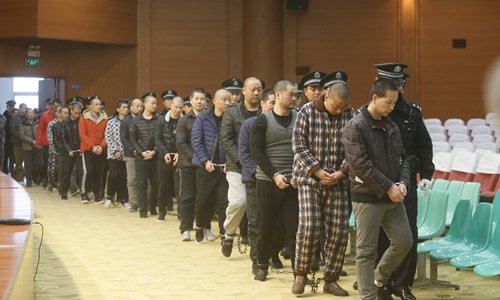Crackdown reveals collusion between officials and organized crime groups
Chinese cities and provinces have uncovered several criminal gang cases involving government and Party officials since the country launched a national campaign against organized crime in January.

A group of suspects head to court for trial in Xi'an in 2017. (Photo: VCG)
The cases revealed details of how some officials became the masterminds and "protective umbrellas" of criminal gangs.
"Compared with previous campaigns of this kind, this year's puts the emphasis on the deeper cause of gang crime, which is collusion between grassroots officials and businessmen," Zhi Zhenfeng, a legal expert at the Chinese Academy of Social Sciences in Beijing, told the Global Times.
Disciplinary agencies and political and legal bureaus should find and tackle the corruption behind gang crime, and should deal with "protective umbrellas" and investigate no matter who is involved, according to the document released by the CPC Central Committee and the State Council on January 24, which also announced the launch of the campaign, according to the Xinhua News Agency.
Closing the umbrella
"Village tyrants" and "protective umbrellas" were the most frequent phrases used in announcements from provincial governments on gang crime in the past three months. Most of the Party and government officials targeted in the crackdown had attempted to obstruct local construction projects.
The Shaanxi provincial disciplinary agency reported five gang crime cases involving village Party officials on April 13.
In one case, Gao Jianmin, former Party secretary of Shuimo village in Xi'an, asked 10 local villagers to enter a construction site and blackmail the construction company for 175,000 yuan.
In South China's Guangdong Province, Liu Yongtian, former Party secretary of Liu village in Guangzhou, once led an organized crime gang. He was said to have established a mafia-like organization to conduct criminal activities including blackmail, assault and extortion, the Guangzhou disciplinary agency announced in March.
Liu was sentenced to 20 years in prison for the crimes of intentional injury, bribery and blackmail on February 10.
Most gang crimes involved grassroots officials accumulating wealth by unfair means and hiring bodyguards when they became worried about their own safety. These groups would then evolve into mafia-like gangs, Su Wei, a professor at the Party School of the Chongqing Committee, told the Global Times.
"Most organized crime is closely related to the crackdown on corruption, and this year's campaign is a continuation of China's anti-graft move launched in 2012," Su said.
Zhi added that the previous anti-graft campaign had resulted in the fall of many influential senior officials, and the campaign on organized crime would see many grassroots officials being arrested.
In gang-related cases, police officers providing protection to gangs have also drawn widespread public attention. A total of 21 police officers in the Huizhou public security bureau in Guangdong Province provided protection to a gang involved in the manufacturing and trafficking of illicit drugs. Some of the policemen involved even received large amounts of money and valuable products from the gang. The policemen received disciplinary punishment and some were expelled from the Party, the Guangdong provincial disciplinary agency announced on March 28.
Gradual growth
Mafia-style organizations usually go through three phrases of development, from collecting "protection fees" in the early stage to starting businesses in coal mining and mineral resource extraction sectors in the mid-stage, and finally coming to high-end businesses such as the financial sector, according to Su.
"In China, most gangs have entered the mid-stage, which means that China faces a very severe situation in the fight against criminal gangs," Su said.
The rapid economic development in China in the last 40 years that bred grey economies also resulted in the growth of gangs, he added.
China's top disciplinary watchdog, the Communist Party of China Central Commission for Discipline Inspection, published a guideline in February, which stressed that disciplinary agencies at all levels should focus on dealing with grassroots officials involved in corruption and organized crime.
Zhi said that local governments should properly deal with land acquisition to prevent collusion between government officials and businessmen.
Su believed that the current campaign is insufficient, and the next step should see the government combining it with regulations in rural development.


